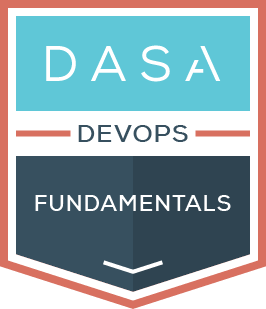Editor’s note: This is the second in a series of blogs discussing five current myths about DevOps and has been created by Lawrie Kirk, our DASA Ambassador located in Australia. Lawrie has written this blog from the perspective of his experience as a consultant, program, and project manager. We look forward to the discussion that is generated from this series.
Absolute statements inevitably create polarised reactions, and the statement, “DevOps can replace Project and Program Management” is no exception. This statement is used in the real world, and that has made me reflect on its relevance.
This article is being written in late November 2021 in Australia, at a time when we are nervously emerging from a long period of Covid-induced lockdowns. This has not only been a time of unique disturbance to our business and personal lives but has also given us the benefit of applications being rapidly changed to meet new client demands. During this time, many of us have logged on remotely to cloud-based servers, worked collaboratively and simultaneously on documents from our intranet during the day, and at day’s end, enjoyed the ability to access streaming services for entertainment. As a result of this strange period in our lives, I have noticed improvements to Zoom, SharePoint, and Netflix, some subtle, some major, but the common outcome is an improved customer experience.
Undoubtedly a DevOps approach has been utilised in many of the applications that we now take for granted. History has shown us that after any period of major disturbance, an unprecedented period of growth and innovation follows. We are now on the cusp of this new period of growth, and DevOps will play a major role in helping rapid innovation to occur. However, will this lead to DevOps replacing program and project management? I think not.
The problem with the statement is the focus on an absolute; the word ‘replace’ implies that program and project management will become redundant, and that immediately polarises responses. I, therefore, propose that it is a myth, as rather than replacing, DevOps should be harmonising with program and project management. The word harmonising is defined in a business context in the Cambridge online dictionary as “… to successfully combine different activities, systems and ideas”. Is this not what we want from DevOps as well as program and project management?
One driver behind the comments that program and project management need to be replaced is that they are too slow to act, too cumbersome with process, and do not seem to deliver immediate value. I agree that examples can be provided to support these statements, but I can also provide many examples where this is not true. Tailorable approaches that are recognised globally as best practice in program and project management, such as Managing Successful Programs (MSP®) and PRINCE2® – both traditional and agile versions – focus on the creation of value with product-based planning at their core. The problems of excessive documentation and lack of agility are often not the fault of the approach but of inexperienced users and inappropriate tailoring by organisations.
Current approaches to program and project management have also adapted and addressed the need to cater for and work in harmony with other approaches that deliver improved business agility. One example was developed by the Agile Business Consortium that now provides guidance to project and program managers through globally used approaches such as Agile Project Management (AgilePM®) and Agile Programme Management (AgilePgM®). These approaches provide a way to work with other approaches to promote greater agility and a renewed focus on the creation of customer-centric and iterative development processes.
The new version of Managing Successful Programmes (v5) now has principles to guide how to deal with ambiguity, bring pace and value, deploy diverse skills, and collaborate across boundaries. These are supported by processes that promote iterative development by designing outcomes, planning progressive deliveries, delivering capabilities, embedding outcomes, evaluating new information, and then feeding back into the delivery loop or closure of the programme. Implementing these processes at a program level has made me realise that DevOps and program and project management should not be competitors within an organisation but rather allies.
The best way I can describe the way to benefit from combining these approaches is to consider an orchestra. Though there are different types of orchestras, the key components are the same, namely strings, winds, and percussion. So, to address the unprecedented time of post-Covid development that we are heading into, should we not strive to create an orchestra? Instead of a PMO (project or program management office), or silo thinking, we can create a Project Management or Program Management Orchestra that blends DevOps, Project, and Program management.
There will be times when this new orchestra focuses on one component to address the needs of the audience, which is no different to a composition that is dominated by strings. However, even with such a composition, there will be underlying support by the wind and percussion sections to create a more fulfilling customer experience. Another thing to consider is that an orchestra is comprised of experienced people with different backgrounds. Remember that some of the sweetest music comes from some of the oldest instruments. So, don’t discount the input from program and project managers who have been around for a while.
To create harmony, we can all start to learn more about each other’s roles. For project and program managers, take time to learn the language of DevOps. The DevOps Fundamentals Certification is designed to provide the core education necessary to build your DevOps vocabulary and understand its principles and practices. For DevOps team members, take some time to become familiar with MSP® and other agile approaches to project management. That is the way to start creating your own Project or Program Management Orchestra.
https://dictionary.cambridge.org/dictionary/english/harmonize, accessed 14/11/2021.
MSP® is a (registered) trademark of Axelos Limited. All rights reserved.
PRINCE2® is a (registered) trademark of Axelos Limited. All rights reserved.
AgilePM® is a registered trademark of Agile Business Consortium Limited. All rights reserved.
AgilePgM® is a registered trademark of Agile Business Consortium Limited. All rights reserved.
The views, thoughts, and opinions expressed in the text above belong solely to the author(s) and do not necessarily represent the views of DASA.


DASA DevOps Fundamentals
Provides an extensive introduction to the core agile DevOps principles covering the essential knowledge and skill competences that have been defined by DASA.
